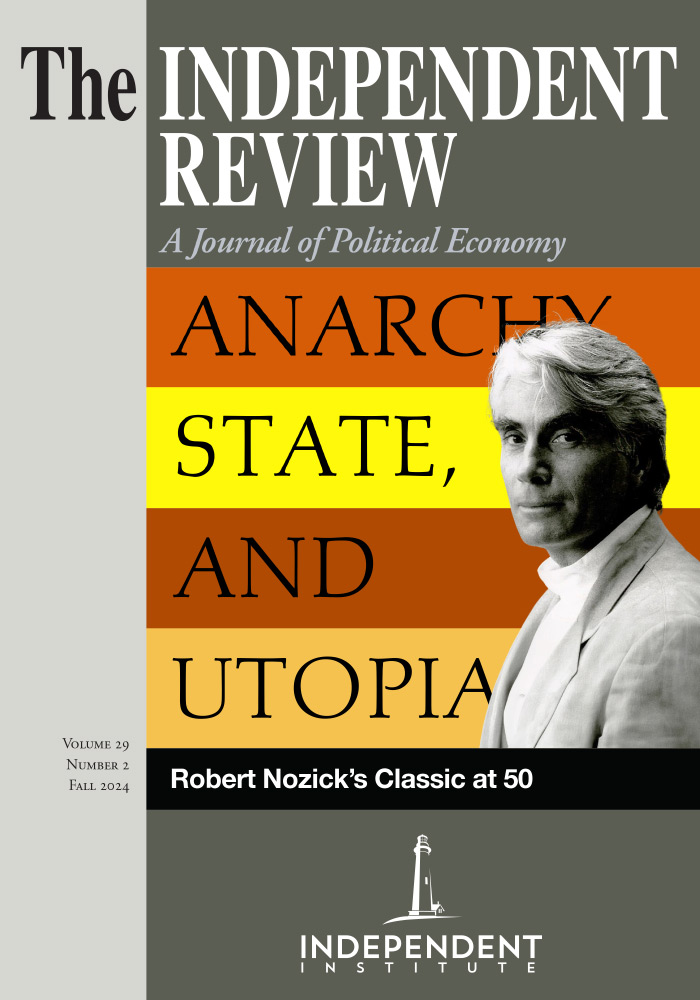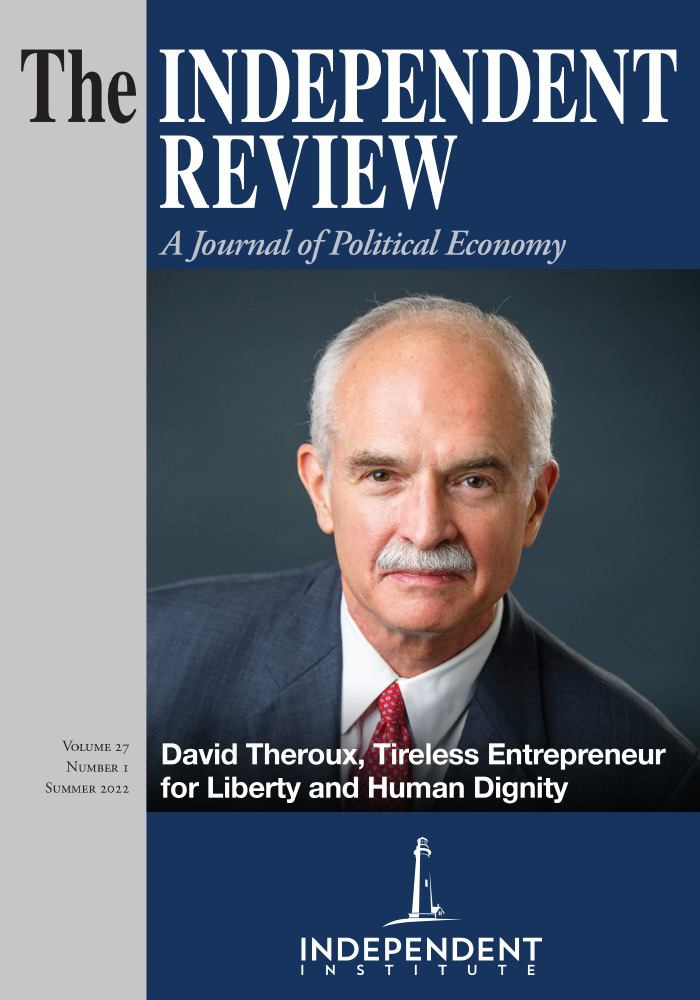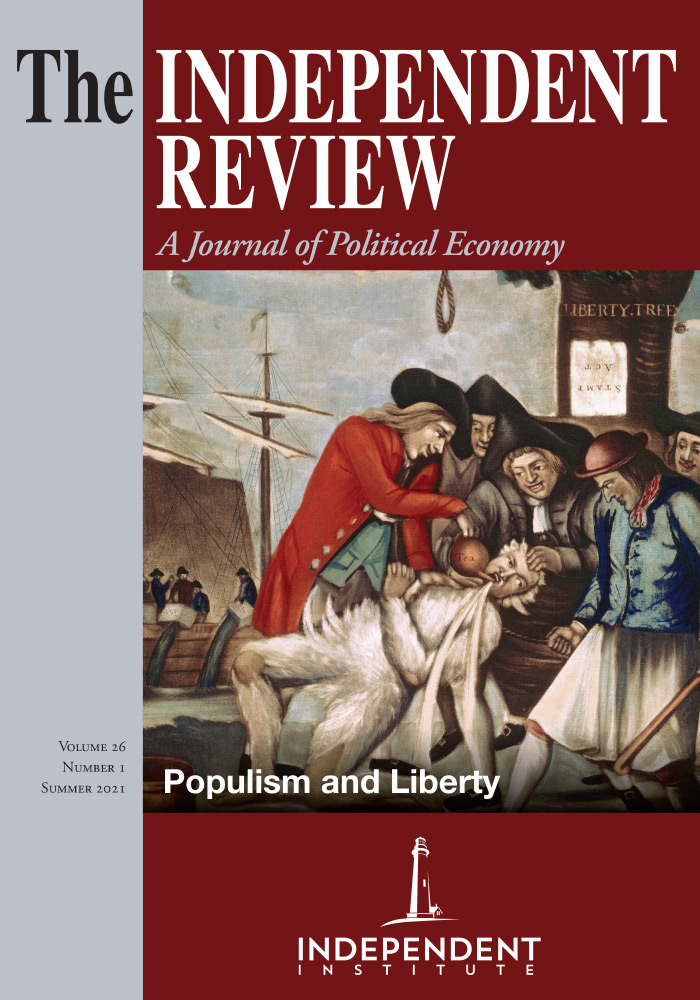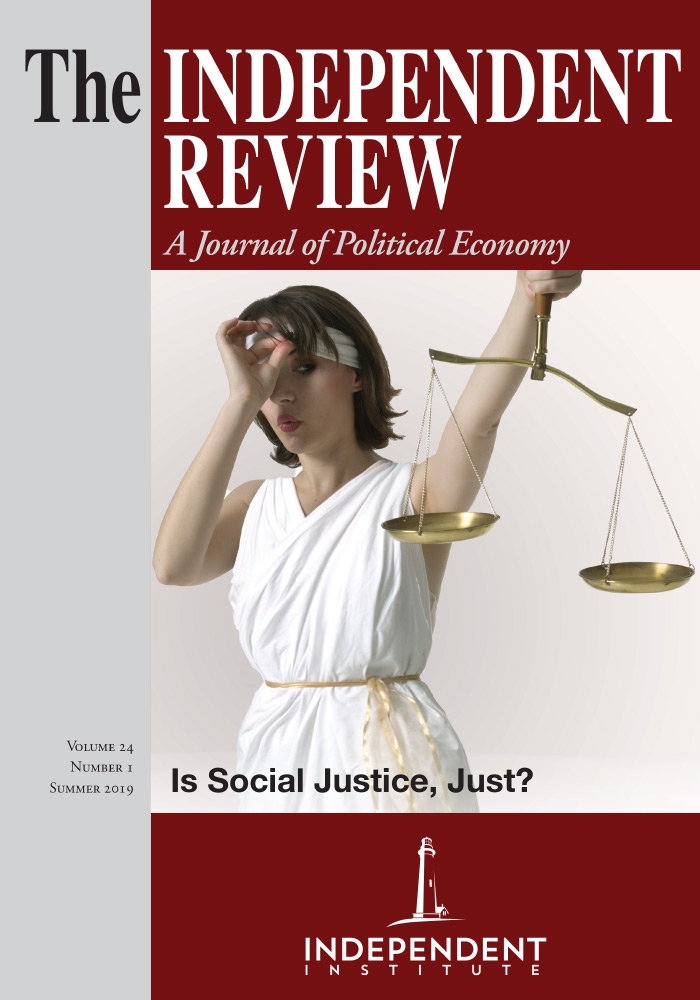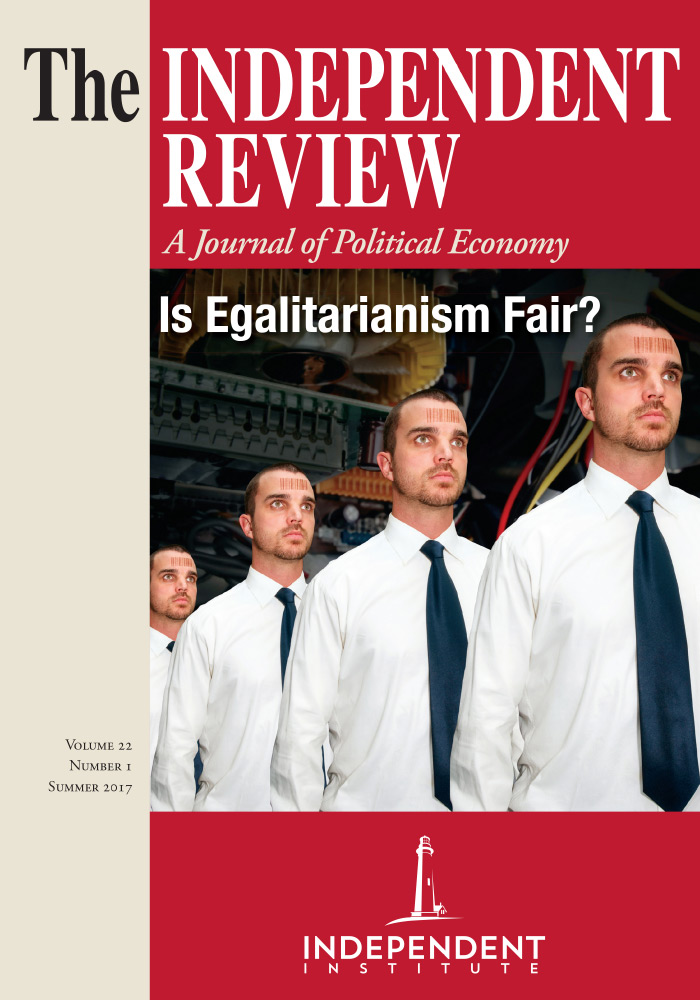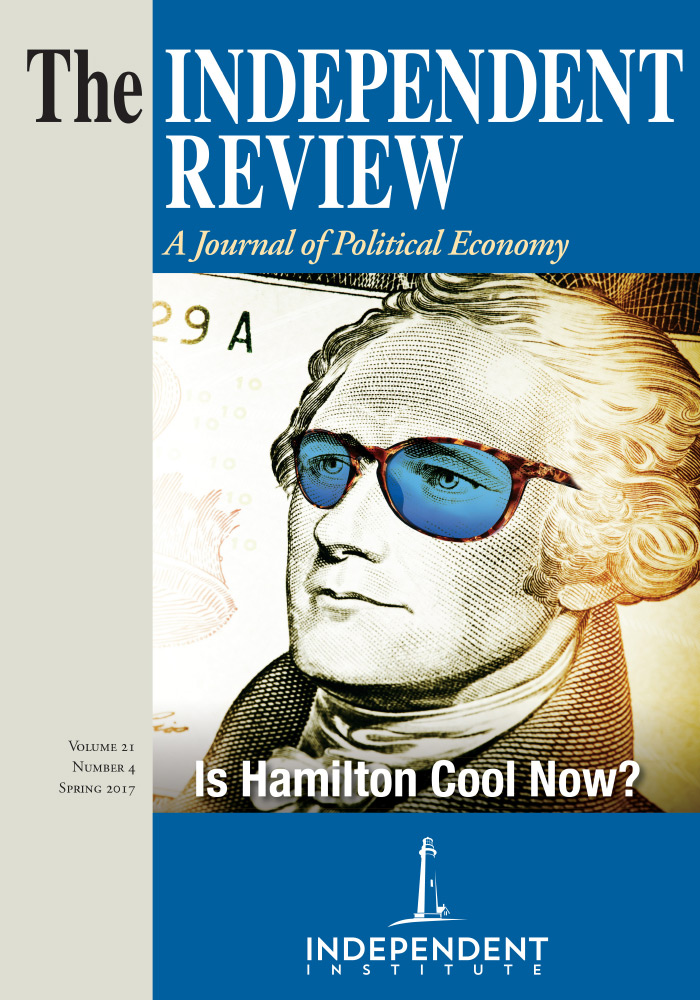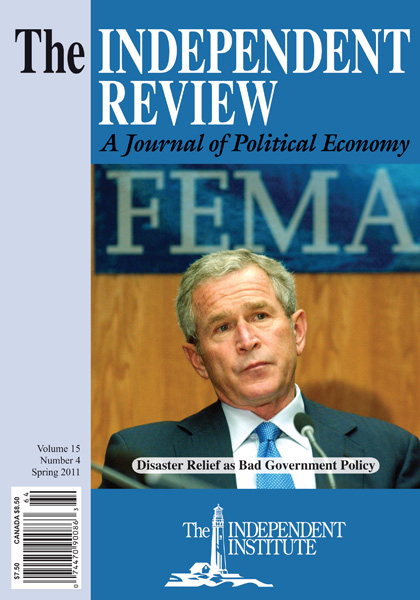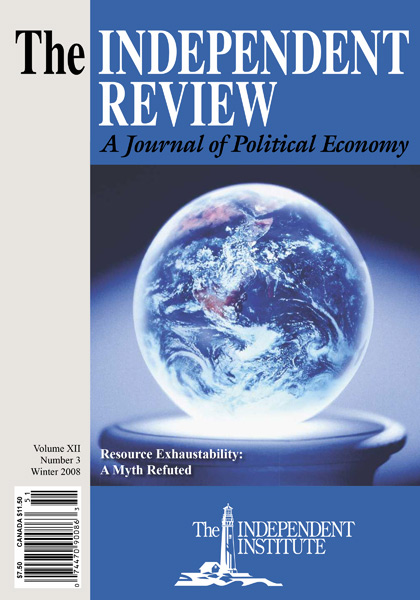This paper was a runner-up in The Independent Review’s 2024 Student Essay Contest.
“Do you leave it to the good-will of the people to pay their taxes? There must be then a great number that pay nothing, without your knowing it.”
“Not at all. . . . Our tribute is not by compulsion, but founded on reason and equity. There is scarce a man amongst us who does not esteem it a point of honour to discharge the most sacred and most legitimate of all debts.”
—Excerpt from Louis-Sébastien Mercier’s utopian novel, Memoirs of the Year Two Thousand Five Hundred
It was this style of society, where citizens paid more than they owed in taxes and joyfully sacrificed their own interests to the public good, that the French Revolutionary government attempted to create after ousting the monarchy. But legislators encountered an obstacle in citizens’ self-interested behavior, which seemed biased toward avarice rather than charity and stubbornly refused to be guided “by the love of the good and the consciousness of the needs of the Homeland” (Robespierre 1794). To combat the self-interest they saw as selfish while still reaping the economic benefits of deregulation, legislators sought to restrain socially nonoptimal behavior through reeducation rather than explicit legal prohibition. The resulting attempt to exercise control via massive reprogramming of values, skirting the need for laws, force, or direct incentive, reflected a misunderstanding of economic self-interest and freedom under a legal system that swiftly culminated in the tragedy of the Terror.
Critical to the French Revolutionary search for utopian government was the understanding that self-interest—which contemporary scholars termed “self-love”—was both an unavoidable condition of human nature and, within certain constraints, a force for economic prosperity.[1] Freedom of action had long been a watchword for the French physiocrats, who preached a combination of free trade and self-love to promote social wealth through agriculture. French philosopher Jean-Jacques Rousseau, the darling of revolutionary leader Maximilien Robespierre, believed that self-love was a prerequisite in the development of virtue (Internet Encyclopedia of Philosophy n.d.). As Richard B. Du Boff (1966, 435) points out, Adam Smith’s Wealth of Nations was widely read in France during the revolutionary years. Scholars were intrigued by the developing laissez-faire policies of their English neighbors, where self-love was replacing government agents as the primary economic regulator (Du Boff 1966, 435).
Contemporary French policy reflected the growing conviction that freedom of action without excess legal interference was beneficial both to individuals and to society at large. One need only investigate the frequency with which Robespierre invokes the phrase la liberté—and the political triumphs it won for him—to realize how sincerely the revolutionaries prized free action as the antithesis of monarchical policies.[2] Not all liberté rhetoric applied to economic activity, but many policies adopted by the Committee of Public Safety (with Robespierre at its head) and the National Convention indicated that legislators looked favorably on at least partial economic freedom. During an April convention, for example, Robespierre pointed out that excessively severe laws affecting merchants would discourage trade, which would lead to scarcity (Robespierre [1794] 1967, 384; translated throughout by the present author).[3] Elsewhere, the Comité de mendacité [Committee on Poverty] reported, “The liberty that . . . assures to each the fruit of his work, is without a doubt the foremost and best encouragement to labor” ([1791] 1911, 432; trans. by present author). Its recommendations to establish systematic welfare assumed that “the freedom of the individual, his industry, and with that the freedom of commerce, should not be constrained” (Comité de mendacité[1791] 1911, 438).
Yet, despite these acknowledgments that freedom and self-love could be beneficial, there remained a nagging sense that self-love was what had gotten France entangled in the economic disaster that plagued it throughout the pre-revolutionary years. The pressing problem at the time had been food scarcity, and it was all too easy to trace the cause back to self-loving government officials. France’s peasant population was dependent on cereals, so it seemed bitterly unfair that grain exports should be encouraged to pay off government debt while domestic citizens starved (Neumann 1977, 164). This trade policy doubtless aligned with the authorities’ self-love, but it was anathema to the common man. Hungry working-class citizens did not have calories to burn on hypothesizing institutional arrangements that could realign magistrates’ self-love with their own. The proximate cause of misery was self-love, so this behavior—whether in the legislature or the marketplace—was roundly condemned. One example of the resentment appeared in the 1793 Decree against Profiteers, which began: “Monopoly is a capital crime.”[4]
Thus the paradox: On the one hand, self-love among French citizens seemed to take the form of selfishness, at least as it presented itself in actions taken prior to the Revolution. On the other hand, freedom of action promised manifold economic and social benefits if only citizens could be taught not to abuse it. Thus, coupled with conviction that overregulation had contributed to pre-Revolution economic misery, legislators sought to achieve the transformation of self-love with little or no recourse to the legal code—that is, with minimal provision of direct incentives.
The revolutionary solution to this puzzle was radical because it had never been earnestly tried, but it was not original. The same logic appeared in Aristotle’s Politics, in which the philosopher described an idealized population that retains private property but shares it with all comers. The legislator, Aristotle wrote, must “create in men this benevolent disposition” ([n.d.] 2013) so they will behave generously even when doing so contradicts their interests. Similarly, Robespierre said:
The first care of the legislator ought to be to fortify the principle [virtue] of the government. Thus everything that tends to excite love of country, to purify morals, to elevate souls, to direct the passions of the human heart toward the public interest ought to be adapted or established. . . . Within the scheme of the French Revolution, that which is immoral is impolitic, that which is corrupting is counterrevolutionary. (Robespierre 1794)
Revolutionary “virtue” was neither religious nor ethical. It simply meant acting based on “nothing other than the love of the nation and its laws” (Robespierre 1794). It was “the fundamental principle of popular or democratic government . . . the essential mainspring which sustains it and makes it move” (Robespierre 1794). An exogenous “eternal justice” would be the final judge, jury, and quite often executioner (Robespierre 1794). Laws of justice would be inscribed “not in marble and stone, but in the hearts of all men” (Robespierre 1794). A written legal code would remain indispensable, for it would tell the citizen what he had to do, but he would not need coercion to make him do it (Lepeletier [1793] 1967, 22; trans. by present author).
Soul-level transformation of an entire population’s motivations was an ambitious goal—so ambitious, indeed, that it may be tempting to write it off as political rhetoric. But legislators were quick to turn words into action. In 1793, a mere four years after the Revolution began, Robespierre presented a draft of his transformative plan to the National Convention (Robespierre [1793] 1967, 10), noting his delight that the members were focused on “reconstructing the world,” even though they had not yet settled on a legal code (Robespierre [1793] 1967, 11).[5]
The plan, constructed by the late lawyer Michel Lepeletier, was to create a system of government-sponsored, standardized schools. It was intended to encourage positive social attitudes and, in this, did not differ greatly from modern education plans. What was remarkable was the emphasis the revolutionaries put on the plan (calling it one of three monuments they owed to history) and the plan’s long-term goal (Robespierre [1793] 1967, 11). “I am convinced,” Lepeletier wrote ([1793] 1967, 12), “of the necessity of an entire regeneration and . . . of creating a new people” from the raw material of the next generation. As students, these “new people” would learn to be content with harsh lodging, frugal food, coarse clothing—all the traits, according to Lepeletier, which would turn everyone into a “working man” ([1793] 1967, 20), equalizing all to a subsistence slightly above poverty. These “new people” would love hard labor and rough living, all to be performed under the watchful eye of “communal discipline” and “active surveillance” (Lepeletier [1793] 1967, 20). Form such men, Lepeletier said, and see crime vanish, production double, and misery evaporate ([1793] 1967, 20).[6]
Convincing people to love discomfort and ignore the judgmental eyes of government wardens was a tall order, but public education could undertake the required transformation because “the child’s entire existence belongs to us; the material . . . will never leave the mold; nothing external will distort the changes we will make to him” (Lepeletier [1793] 1967, 24). Attitudes would also change: “[Restored to] the gentle influence of nature, you will be able to give your children to the state without regret . . . [so] they will come back to your families a new source of abundance, bringing strength, health, love for and habituation to work” (Lepeletier [1793] 1967, 27).
It is ironic that the attempt to reduce reliance on a legal code started with the imposition of a law requiring parents to send their children to national schools. From the revolutionary perspective, however, this was a tacit acknowledgment that the virtuous population did not exist yet and that legal restraint would be required until it did. When the question arose of how to handle parents of truant children, Lepeletier conceded that some incentive was needed to prevent self-loving parents from hiring out their offspring to the nearest unscrupulous capitalist. The incentive did not have to be positive; one contemporary writer called it a stimulant, but another termed it an aiguillon, referencing the stinger of an insect or a cattle prod (Robespierre [1793] 1967, 12; trans. by present author). Lepeletier himself had a rigorous legal penalty in mind, calling for dissenters to forfeit citizenship rights and, rather paradoxically, pay double taxes (Lepeletier [1793] 1967, 36).[7] Toward the end of his draft, he proposed a more specific tactic:
[Should they] refuse to comply . . . their names will be inscribed on a notice posted in the towns, in the place of primary and electoral assemblies; the names of those who have complied will be honorably inscribed in another column. (Lepeletier [1793] 1967, 43)[8]
Of critical importance is that his incentive is shame, not force, so there is no direct violation of freedom. Lepeletier’s system, though explicitly legal, managed to acknowledge self-love and reshape it without resorting to prohibition or reward. A parent would not be prevented from keeping his children at home, but doing so would betray dishonorable lack of patriotism. And then, of course, there were double taxes. Would it not be more honorable, more profitable—more aligned with recalcitrant self-love—for the parent to simply send his children to school?
Such a daring and, at the time, innovative plan for transformation did not indicate that the revolutionaries wanted citizens to preserve traditional self-love, generously giving it lower priority than the interests of others. It was not an acknowledgment that self-love and charity could coexist, as modern economists recognize. Rather, the ideal revolutionary would have his self-love so fundamentally transformed, so thoroughly redirected toward almost unrecognizable ends, that he would find his “heavenly and voluptuous pleasure in the calm of a pure conscience and in the ravishing spectacle of the public wellbeing” (Robespierre [1794] 1967, 554). The best illustration of the mentality can be found in the revolutionary term for French government and society, the paternal and deeply affectionate Patrie.[9] Its implication was that the obedience of citizens to their country should be like that of a child to a beloved, feared parent. A good child behaves because his self-love is gratified when his parents are pleased. The mischievous child behaves because he fears punishment, for his self-love is misdirected. Hence the revolutionaries could assert that the mainspring of the revolutionary government was “virtue, without which terror is fatal; terror, without which virtue is impotent” (Robespierre 1794), for this was the only combination of appeal and punishment that could win over both “good” and “bad” citizens.
There is, of course, a deadly flaw in the plan to reformulate self-love on this paternal model, which Lepeletier’s incentive system recognized but did not resolve. Even if the next generation of citizens was to be successfully educated to value public over private good, there was no way to reeducate the adult population. Reared under aristocratic rule and accustomed to the abuses of the monarchy, these adults would see no difficulty with, for example, charging market rates for scarce commodities. This behavior was the result of uneducated self-love that was too entrenched to be completely reformed, and since adults could not be sent back to school, laws were the only sure method of restraining them. The scope of la liberté was thus eroded by the ever-increasing, cyclical cruelty of regulation and punishment. True freedom remained around the corner, hidden in the hearts of the new style of humanity the revolutionaries hoped to create.
Legislators were eventually forced to conclude that the person whose self-love did not, and stubbornly would not, align with la Patrie was an obstacle to social progress. The admission that reeducating self-love was incompatible with freedom—that the original paradox had no solution besides the free exercise of free will—led to the bloodshed of the Terror and, eventually, to a tyranny more brutal than its monarchical predecessors. The head of Smith’s self-loving man rolled beneath the guillotine because it would not bow to a form of ambition and virtue it did not recognize.[10]
Robespierre would soon follow, a protesting victim of the system he had done much to shape. His death was the result, he complained to a now-hostile National Convention, of a government in which “the influence of integrity and of principles will be compared to the force of tyranny” (Robespierre [1794] 1967, 575)—a verdict that both the convention and history duly rendered.
References
Aristotle. [n.d.] 2013. “Politics.” In The History of Economic Thought: A Reader, 2nd edition, edited by Steven G. Medema and Warren J. Samuels. New York: Routledge. Ebook.
Comité de mendicité. [1790–1791] 1911. Rapports du Comité de mendicité de la constituante, edited by Camille Block and Alexandre Tuetey. Paris: Imprimerie Nationale.
De Lisle, Claude Joseph Rouget. 1792. “La Marsellaise.”
Du Boff, Richard B. 1966. “Economic Thought in Revolutionary France, 1789–1792: The Question of Poverty and Unemployment.” French Historical Studies 4, no. 4 (Autumn): 434–51.
Hesse, Carla. 1999. “The Law of the Terror.” Modern Language Notes 114, no. 4: 716.
Internet Encyclopedia of Philosophy. n.d. “Jean-Jacques Rousseau.” Accessed October 24, 2023. https://iep.utm.edu/rousseau/.
Kelly, Catriona. 2016. “The New Soviet Man and Woman.” Oxford Handbook of Modern Russian History online edition (December). https://doi.org/10.1093/oxfordhb/9780199236701.013.024.
Mercier, Louis-Sébastien. [1771] 1772. Memoirs of the Year Two Thousand Five Hundred. Vol. 2. Translated by W. Hooper. London: G. Robinson.
Michalopoulos, Stelios, and Raphael Franck, Noel Johnson, Theresa Finley. 2017. “Economic Consequences of Revolutions: Evidence from the 1789 French Revolution.” Center for Economic Policy Research. December 2, 2017.
National Convention. 1793. Decree Against Profiteers. Paris, France. https://revolution.chnm.org/items/show/436.
Neumann, J. 1977. “Great Historical Events That Were Significantly Affected by the Weather: 2, The Year Leading to the Revolution of 1789 in France.” Bulletin of the American Meteorological Society 58, no. 2 (February): 163–64.
Lepeletier, Michel. [1793] 1967. “Éducation nationale.” In Œuvres de Maximilien Robespierre,vol. 10, edited by Marc Bouloiseau and Albert Soboul. Paris: Presses Universitaires de France.
Rioult, Claire, and Romain Fathi. “The French Revolution Executed Royals and Nobles, Yes—but Most People Killed Were Commoners.” The Conversation. July 12, 2023.
Robespierre, Maximilien. [1793–1794] 1967. Œuvres de Maximilien Robespierre. Vol. 10. Edited by Marc Bouloiseau and Albert Soboul. Paris: Presses Universitaires de France.
———. 1794. “On Political Morality.” Transcript of speech delivered before the National Convention, Paris, February 5, 1794. https://revolution.chnm.org/d/413.
———. 1792. “On Subsistence Goods.” Transcript of a speech delivered before the National Convention, Paris, 1792. Translated by Mitch Abidor.
Wise, Maurice K. 1944. “Requisition During the French Revolution (1789–1815).” Louisiana Law Review 6, no. 1 (1944): 53.
Notes
[2] “La liberté” appears over six hundred times in Robespierre’s collected Œuvres [Works]. Most occurrences of the word are rhetorical, appearing in phrases such as “enemies of la liberté” or “true friends of la liberté.”
[3] Some translations have been slightly modernized while preserving the original sense.
[4] “Monopoly” in the contemporary sense was more obviously related to self-interest than modern usage suggests. It meant withholding from sale or wasting essential merchandise (National Convention 1793). The general hatred of price gouging was, as usual, best expressed by Robespierre, who proclaimed that laws existed to “stop the homicidal hand of the monopolizer, as it does that of the ordinary assassin” (Robespierre 1792).
[5] Two days prior, a full third of the convention’s debate (as recorded in the Œuvres)was spent on the question of whether the public should be allowed to consume sugar and coffee. La liberté eventually prevailed.
[6] There is an evident analogy to the новый советский человек [New Soviet Person, often rendered “man”]. Lepeletier’s plan includes references to idealized physical strength, moral character, bodily health, self-denial, perseverance, love of the commonwealth, and patriotism—all attributes associated with the perfected Soviet. Likewise, both Lepeletier and the Soviets extolled education for both sexes (Kelly 2016).
[7] Robespierre and several other committee members did not want to make national education mandatory. Their reasons are obscure; perhaps it was in the interest of preserving la liberté,or perhaps they thought no incentive was required (Robespierre [1793] 1967, 11).
[8] This bears a curious resemblance to Mercier’s 1771 utopian novel, referenced in the epigraph, where citizens who did not pay their taxes could expect to have their names engraved on publicly posted tablets. The strangeness of the idea and the remarkable similarity suggests, if not direct relation between Lepeletier’s plan and Mercier’s novel, at least a common antecedent.
[9] Proper noun capitalization is often found in original texts.
[10] A modern misconception is that the guillotine was primarily employed to execute nobles. In fact, the vast majority of victims were commoners (Rioult and Fathi 2023). Among criminalized acts were many that were self-loving and not socially undesirable, such as making shoes below a certain size and quality (Hesse 1999, 716).




